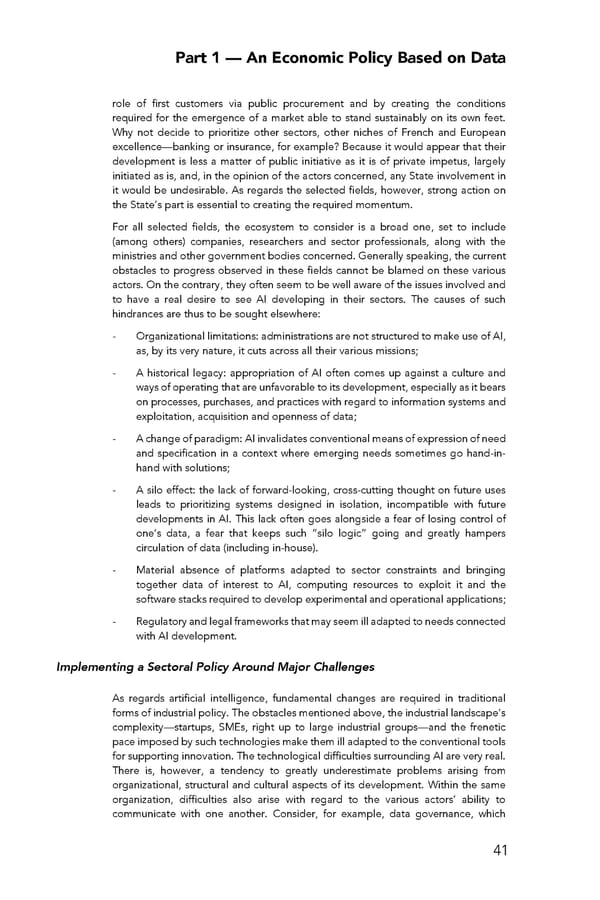Part 1 — An Economic Policy Based on Data role of first customers via public procurement and by creating the conditions required for the emergence of a market able to stand sustainably on its own feet. Why not decide to prioritize other sectors, other niches of French and European excellence—banking or insurance, for example? Because it would appear that their development is less a matter of public initiative as it is of private impetus, largely initiated as is, and, in the opinion of the actors concerned, any State involvement in it would be undesirable. As regards the selected fields, however, strong action on the State’s part is essential to creating the required momentum. For all selected fields, the ecosystem to consider is a broad one, set to include (among others) companies, researchers and sector professionals, along with the ministries and other government bodies concerned. Generally speaking, the current obstacles to progress observed in these fields cannot be blamed on these various actors. On the contrary, they often seem to be well aware of the issues involved and to have a real desire to see AI developing in their sectors. The causes of such hindrances are thus to be sought elsewhere: - Organizational limitations: administrations are not structured to make use of AI, as, by its very nature, it cuts across all their various missions; - A historical legacy: appropriation of AI often comes up against a culture and ways of operating that are unfavorable to its development, especially as it bears on processes, purchases, and practices with regard to information systems and exploitation, acquisition and openness of data; - A change of paradigm: AI invalidates conventional means of expression of need and specification in a context where emerging needs sometimes go hand-in- hand with solutions; - A silo effect: the lack of forward-looking, cross-cutting thought on future uses leads to prioritizing systems designed in isolation, incompatible with future developments in AI. This lack often goes alongside a fear of losing control of one’s data, a fear that keeps such “silo logic” going and greatly hampers circulation of data (including in-house). - Material absence of platforms adapted to sector constraints and bringing together data of interest to AI, computing resources to exploit it and the software stacks required to develop experimental and operational applications; - Regulatory and legal frameworks that may seem ill adapted to needs connected with AI development. Implementing a Sectoral Policy Around Major Challenges As regards artificial intelligence, fundamental changes are required in traditional forms of industrial policy. The obstacles mentioned above, the industrial landscape’s complexity—startups, SMEs, right up to large industrial groups—and the frenetic pace imposed by such technologies make them ill adapted to the conventional tools for supporting innovation. The technological difficulties surrounding AI are very real. There is, however, a tendency to greatly underestimate problems arising from organizational, structural and cultural aspects of its development. Within the same organization, difficulties also arise with regard to the various actors’ ability to communicate with one another. Consider, for example, data governance, which 41
 For a Meaningful AI - Report Page 41 Page 43
For a Meaningful AI - Report Page 41 Page 43